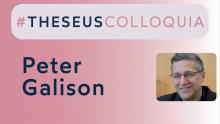Technologies of the Self: Rorschach Test, Cybernetic Person-Machines, Nuclear Futures
How do scientific and technical objects both presuppose and shape the scientific self? We begin with a discussion of what such a historical, transcendental materialism might be in the early 20th century—using the Vienna Circle's philosophical interest in Bauhaus architecture on the one side, and the famous ink blots of Hermann Rorschach on the other. What does each presuppose about the self—how do these technologies, once ubiquitous, become guides to how we understand ourselves? During World War II/the Cold War, another form of technology purported to be such a guide to self: Norbert Wiener's electro-mechanical feedback-designed anti-aircraft gun that folded into cybernetics. What does this mean for intention—the very fabric of the will-based self that for so long dominated "das Ich." Finally, toward the turn of the 20th to 21st centuries, we turn to the materiality of land in an age of intense technical intervention. As they are usually understood, "nuclear wasteland" and "pure wilderness" are opposites; when they converge on the sites of decommissioned nuclear weapons lands, we often describe this circumstance as "paradoxical" or "ironic," but they are not. Removing parts of the earth for 25,000 years—for reasons of sanctification or despoilment—alters a central feature of the human self in relation to the physical world, raising irreducible questions about who we are and will be 400 generations in the future.
Interviene: Peter Galison, professore Joseph Pellegrino presso l'Università di Harvard. Attualmente dirige la Black Hole Initiative di Harvard, un centro di ricerca interdisciplinare sui buchi neri. Tra i suoi libri ricordiamo How Experiments End; Image and Logic: A Material Culture of Microphysics; Einstein's Clocks, Poincaré's Maps; e, con Lorraine Daston, Objectivity. Il suo ultimo film è Black Holes | The Edge of All We Know.
Introduce: Roberto Lalli (docente di Storia della Scienza e della Tecnica, Politecnico di Torino)
